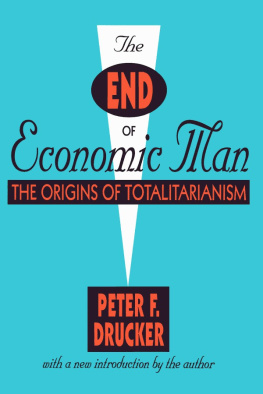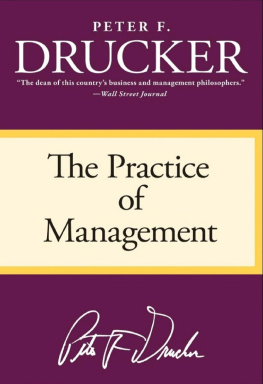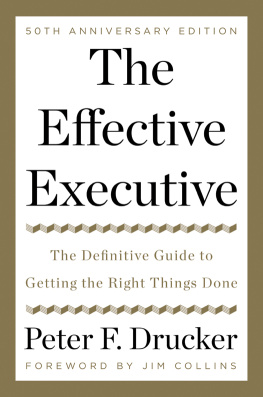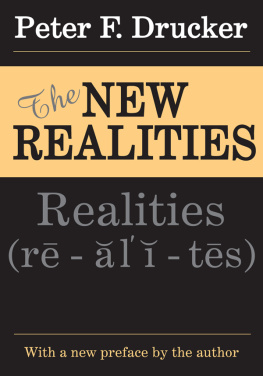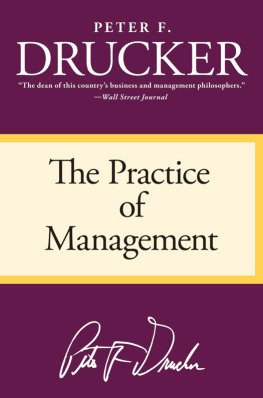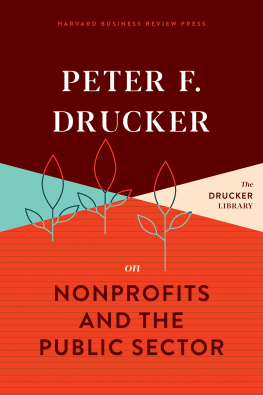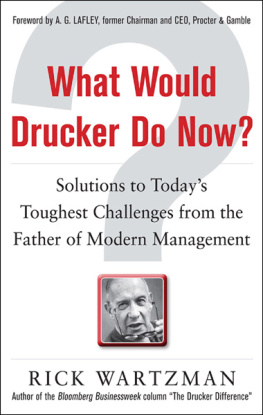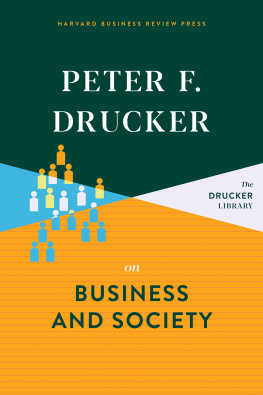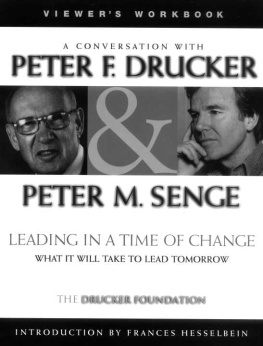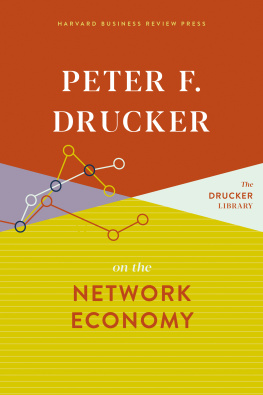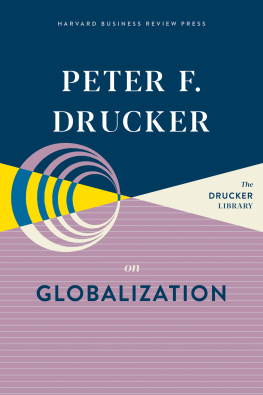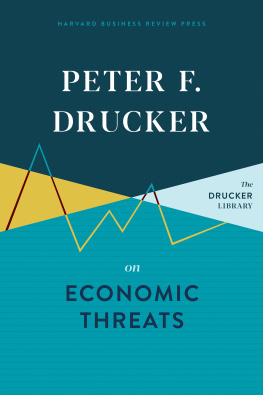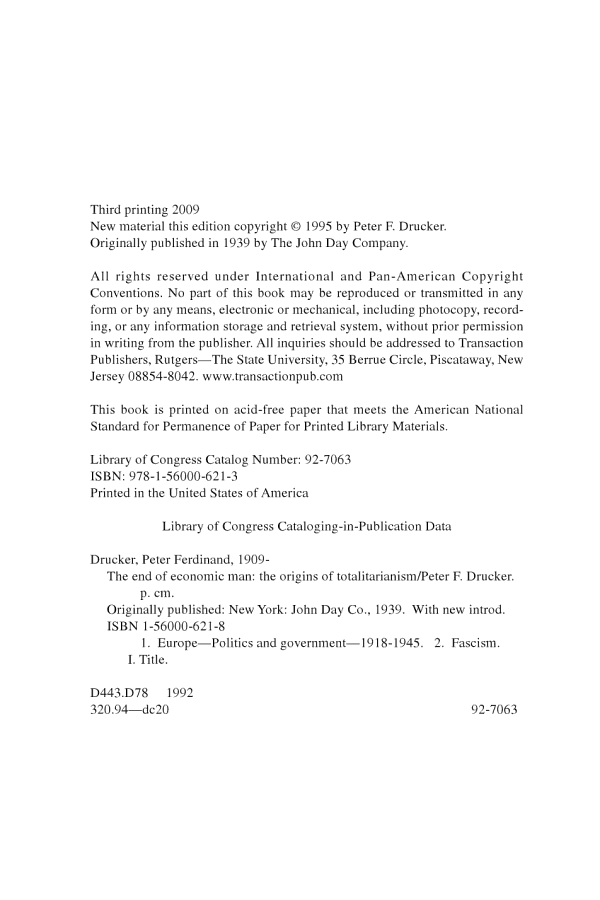To Doris
INTRODUCTION TO THE TRANSACTION EDITION
The End of Economic Man was my first book, and at the time of its publication I was still an unknown young man. Yet the book received tremendous attention when it came out in the spring of 1939, and was an instant success. It was even more successful in Britain than in the United States. Winston Churchill, then still out of office, wrote the first review, and a glowing one. When, a year later, after Dunkirk and the fall of France, he became prime minister he gave the order to include The End of Economic Man in the book kit issued to every graduate of a British Officers' Candidate School. (It was, appropriately enough, packaged together with Lewis Carroll's Alice in Wonderland by somebody in the War Department with a sense of humor.)
Although this book was published more than fifty years ago, it was actually written even earlier. It was begun in 1933, a few weeks after Hitler had come to power. An early excerptthe discussion of the role of anti-Semitism in the Nazi demonology and the reasons for its appealwas published as a pamphlet by an Aus trian Catholic and anti-Nazi publisher in 1935 or 1936. And it was finished between April 1937, when I first arrived in the United States from England, and the end of that year. It was the first book to try to explain the origins of totalitarianismits subtitle. It has kept on selling. Indeed it has been reissued several times before this republication as a Transaction book, the last time in 1969 (the preface to that reissue is included in this volume). And lately the book has again gotten a fair amount of scholarly attention.
But for a long time during the nineteen-sixtiesand indeed, well into the nineteen-seventiesthe book was pointedly ignored by the scholarly community. One reason: it was not "politically correct" to use current jargon. It fitted neither of the two politically acceptable theses of the postwar period: the thesis that Nazism was a "German" phenomen to be explained by German history, German character, German specifics of one kind or another or the Marxist thesis of Nazism as the "last gasp of dying capitalism." This book, instead, treated Nazismand totalitarianism altogetheras a European disease, with Nazi Germany the most extreme, most pathological manifestation and with Stalinism being neither much different nor much better. Anti-Semitism, for instance, appeared first as persecution and popular demagoguery in France, rather than in Germany, in the Dreyfus Affair of the eighteen-nineties. And it was the failure of Marxismrather than that of capitalismas a creed and as a savior, The End of Economic Man as serted, that led to the "despair of the masses" and made them easy prey to totalitarian demagoguery and demonology.
But there was a second reason why the book did not fit into the scholarly climate of the postwar period. It is the more important one, simply because the climate still persists. This book treats a major social phenomenon as a social phenomenon. This is still largely considered heresy (except by such fellow-heretics as the publishers of Transaction books and Society magazine). Major social phenomena are treated either as political and economic history, that is, in terms of battles, armies, treaties, politicians, elections, national-income statistics, and so on. (A good example for Germany and Nazism are the excellent books of the Stanford historian Gordon Craig, for example, his 1978 book Germany: 1866 1945.) Such developments are also explained in terms of "isms," that is, in terms of all-embracing philosophies. The prototype and exemplar of this approach for our theme is the 1951 book by Hannah Arendt The Origins of Totalitarianism which blames Hitler and Nazism on the systematic German philosophers of the early nineteenth century: Fichte, Schelling, or Hegel.
No matter how valid either approach, they are not adequate by themselves. The stool needs a third leg. Social phenomena need social analysis, an analysis of the strains, stresses, trends, shifts, and upheavals in society. This, I would maintain, is what sociology was meant to do, was indeed invented for in the early years of the last century. It is what the great men of sociology, a Max Weber (1864-1920) or a Vilfredo Pareto (18641923), did. It is what Joseph Schumpeter (1883-1950) did when he identified the "innovator" as the social force that turns economies upside down; the innovator does not behave economically, does not try to optimize, is not motivated by economic rationalehe is a social phenomenon. It is what this book tries to do.
"Society" is vague and impossible to define, argue my historian friends, my economist friends, my philosopher friends. They are absolutely right. But equally resistant to definition are history, economics, philosophy, nation, science, and poetryindeed everything worthwhile thinking, talking, and writing about.
Yet all of us know what to do with these terms "plus or minus 80%" as the statisticians would say that is, adequate for operational purposes (despite everything the linguistic logicians say to the contrary). The End of Economic Man treats society as the environment of that very peculiar critter, the human being. History treats what happens on the surface, so to speak. "Isms" that is philosophical systemsmay be called the atmosphere. But society is the "ecology."
This book does not attempt to define "society." It tries to understand it. Whether it succeeds in this attempt readers must decide for themselves. But this book was the first attempt to understand the major social phenomenon of the first half of this century, that is, the rise of totalitarianism as a social event. It is still, half a century later, the only such attempt. This alone, I hope, makes it worthwhile reading.
Peter F. Drucker
Claremont, California
October 1994
PREFACE TO THE 1969 EDITION
When this book first came out, in 1939thirty long years agoit was shockingly unconventional and heretical. It was, of course, by no means alone in its uncompromising rejection of the totalitarian creeds, or even in its firm conviction that Nazism was pure evil sans qualification or extenuation. But the other booksand there were hundreds of themall explained away Hitler in those years before World War II. They either came up with some pseudo-history of Nazism as a "manifestation of German national character," or they depicted Nazism (and Fascism) as the "dying gasp of capitalism," with Marxist socialism as the coming saviour. In this book, however, the "national-character" explanation is dismissed as intellectually shoddy; national character or national history may explain how a people does things, but not what things it does. This book rather diagnosed Nazism and Fascismas a pervasive sickness of the European body politic. And instead of proclaiming Marxism as the coming saviour, I asserted that the total failure of Marxism had been a main reason for the flight of Europe's masses into the fervency of totalitarian despair.
These views, and the conclusions to which they led, were so heretical in the nineteen-thirties that I myself hesitated a long time before publishing them. The first draft of this book containing its main theses was actually done when Hitler was coming to power in 1933; I was, however, so perturbed by my own findings, inescapable though they seemed, that I decided to hold the manuscript until I could test its conclusions against actual events. But even after my predictions had been proven correct by the developments of the 'thirties, no publisher was willing for a long time to bring out the book. It was far too "extreme" in its conclusions: that Hitler's anti-Semitism would be propelled by its inner logic towards the "ultimate solution" of killing all Jews; that the huge armies of Western Europe would not offer effective resistance to the Germans; or that Stalin would end up signing a pact with Hitler.

